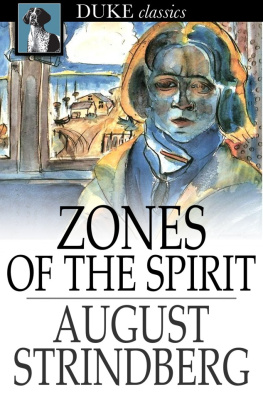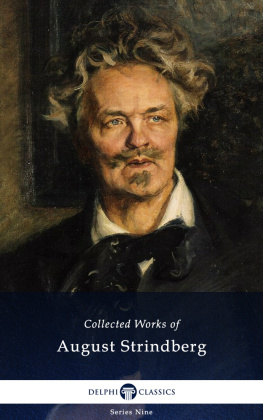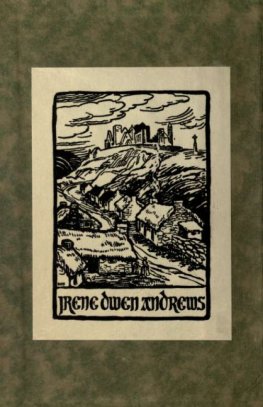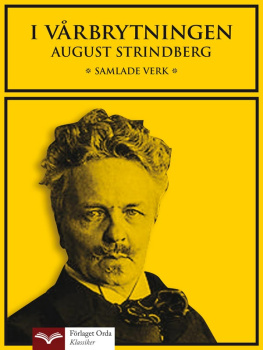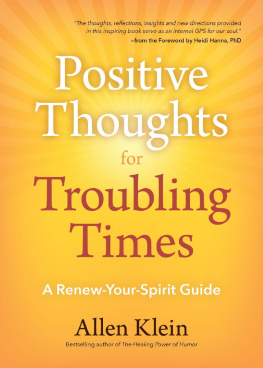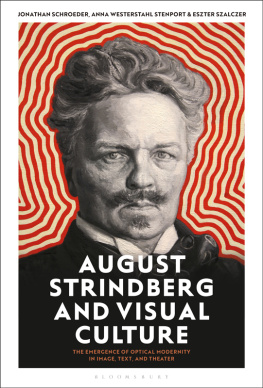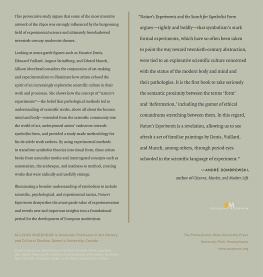August Strindberg - Zones of the Spirit: A Book of Thoughts
Here you can read online August Strindberg - Zones of the Spirit: A Book of Thoughts full text of the book (entire story) in english for free. Download pdf and epub, get meaning, cover and reviews about this ebook. year: 2014, publisher: Duke Classics, genre: Science. Description of the work, (preface) as well as reviews are available. Best literature library LitArk.com created for fans of good reading and offers a wide selection of genres:
Romance novel
Science fiction
Adventure
Detective
Science
History
Home and family
Prose
Art
Politics
Computer
Non-fiction
Religion
Business
Children
Humor
Choose a favorite category and find really read worthwhile books. Enjoy immersion in the world of imagination, feel the emotions of the characters or learn something new for yourself, make an fascinating discovery.
- Book:Zones of the Spirit: A Book of Thoughts
- Author:
- Publisher:Duke Classics
- Genre:
- Year:2014
- Rating:4 / 5
- Favourites:Add to favourites
- Your mark:
- 80
- 1
- 2
- 3
- 4
- 5
Zones of the Spirit: A Book of Thoughts: summary, description and annotation
We offer to read an annotation, description, summary or preface (depends on what the author of the book "Zones of the Spirit: A Book of Thoughts" wrote himself). If you haven't found the necessary information about the book — write in the comments, we will try to find it.
Swedish writer August Strindberg was a creative force of nature who produced significant works in a staggering array of fields, though he is best remembered around the world as an important innovator in the field of twentieth-century drama. Zones of the Spirit is an eclectic selection of Strindbergs thoughts, observations, and aphorisms that is sure to inspire.
Zones of the Spirit: A Book of Thoughts — read online for free the complete book (whole text) full work
Below is the text of the book, divided by pages. System saving the place of the last page read, allows you to conveniently read the book "Zones of the Spirit: A Book of Thoughts" online for free, without having to search again every time where you left off. Put a bookmark, and you can go to the page where you finished reading at any time.
Font size:
Interval:
Bookmark:

A Book of Thoughts
First published in 1913
ISBN 978-1-62013-790-1
Duke Classics
2014 Duke Classics and its licensors. All rights reserved.
While every effort has been used to ensure the accuracy and reliability of the information contained in this edition, Duke Classics does not assume liability or responsibility for any errors or omissions in this book. Duke Classics does not accept responsibility for loss suffered as a result of reliance upon the accuracy or currency of information contained in this book.
Seldom has a man gone through such profound religious changes as thisSwede, who died last May. The demonic element in him, which spurredhim on restlessly, made him scale heaven and fathom hell, gave himglimpses of bliss and damnation. He bore the Cain's mark on his brow:"A fugitive and a wanderer shalt thou be."
He was fundamentally religious, for everyone who searches after Godis so,a commonplace truth certainly, but one which needs to beconstantly reiterated. And Strindberg's search was more painful,exact, and persevering than that of most people. He was never contentwith superficial formulas, but pressed to the heart of the matter,and followed each winding of the labyrinthine problem with endlesspatience. Too often the Divinity which he thought he had discoveredturned out a delusion, to be scornfully rejected the moment afterwards.Until he found the God, whom he worshipped to the end of his days,and whose existence he resolutely maintained against deniers.
As a child he had been brought up in devout belief in God, insubmission to the injustice of life, and in faith in a betterhereafter. He regarded God as a Father, to Whom he made known hislittle wants and anxieties. But a youth with hard experiences followedhis childhood. The struggle for daily bread began, and his heavenlyFather seemed to fail him. He appeared to regard unmoved, from someOlympian height, the desperate struggles of humanity below. Then thedefiant element which slumbered in Strindberg wrathfully awoke, and hegradually developed into a free-thinker. It fared with him as it oftendoes with young and independent characters who think. Beginning withdissent from this and that ecclesiastical dogma, his criticism embracedan ever-widening range, and became keener and more unsparing. At lastevery barrier of respect and reverence fell, the defiant spirit ofyouth broke like a flood over all religious dogmas, swept them away,and did not stop short of criticising God Himself.
Meanwhile his daily life, with its hard experiences, went on. Bookswritten from every conceivable point of view came into his hands.Greedy for knowledge as he was, he read them all. Those of thefree-thinkers supported his freshly aroused incredulity, which as yetneeded support. His study of philosophical and scientific works made aclean sweep of what relics of faith remained. Anxiety about his dailybread, attacks from all sides, the alienation of his friends, allcontributed towards making the free-thinker into an atheist. How canthere be a God when the world is so full of ugliness, of deceit, ofdishonour, of vulgarity? This question was bound to be raised at last.About this time he wrote the New Kingdom, full of sharp criticisms ofsociety and Christianity.
As an atheist Strindberg made various attempts to come to terms withthe existing state of things. But being a genius out of harmony withhis contemporaries, and always longing for some vaster, fairer future,this was impossible for him. When he found that he came to no goal,a perpetual unrest tortured him. His earlier autobiographic writingsappeared, marked by a strong misanthropy, and composed with an obscureconsciousness of the curse: "A fugitive and a wanderer shalt thou be."
At last his consciousness becomes clear and defined. He recognisesthat he is a lost soul in hell already, though outwardly on earth.This was the most extraordinary period in Strindberg's life. Helived in the Quartier Latin in Paris, in a barely furnished room,with retorts and chemical apparatus, like a second Faust at the endof the nineteenth century. By experiments he discovered the presenceof carbon in sulphur, and considered that by doing so he "had solveda great problem, upset the ruling systems of chemistry, and gainedfor himself the only immortality allowed to mortals." He came to theconclusion that the reason why he had gradually become an atheist wasthat "the Unknown Powers had left the world so long without a sign ofthemselves." The discovery made him thankful, and he lamented that hehad no one to thank. From that time the belief in "unknown powers" grewstronger and stronger in him. It seems to have been the result of analmost complete, long, and painful solitude.
At this time his brain worked more feverishly, and his nerves weremore sensitive than usual. At last he reached the (for an atheist)astounding conclusion: "When I think over my lot, I recognise thatinvisible Hand which disciplines and chastens me, without my knowingits purpose. Must I be humbled in order to be lifted up, lowered inorder to be raised? The thought continually recurs to me, 'Providenceis planning something with thee, and this is the beginning of thyeducation.'"
Soon after this he gave up his chemical experiments and took upalchemy, with a conviction, almost pathetic in its intensity, thathe would succeed in making gold. Although his dramas had alreadybeen performed in Paris, a success which had fallen to the lot of noother Swedish dramatist, he forgot all his successes as an author,and devoted himself solely to this new pursuit, to meet again withdisappointment.
On March 29, 1897, he began the study of Swedenborg, the NorthernSeer. A feeling of home-sickness after heaven laid hold of him, and hebegan to believe that he was being prepared for a higher existence. "Idespise the earth," he writes, "this unclean world, these men and theirworks. I seem to myself a righteous man, like Job, whom the Eternal isputting to the test, and whom the purgatorial fires of this world willsoon make worthy of a speedy deliverance."
More and more he seemed to approach Catholicism. One day he, the formersocialist and atheist, bought a rosary. "It is pretty," he said,"and the evil spirits fear the cross." At the same time, it must beconfessed that this transition to the Christian point of view did notsubdue his egotism and independence of character. "It is my duty," hesaid, "to fight for the maintenance of my ego against all influenceswhich a sect or party, from love of proselytising, might bring tobear upon it. The conscience, which the grace of my Divine protectorhas given me, tells me that." And then comes a sentence full of joyand sorrow alike, which seems to obliterate his whole past. "Bornwith a home-sick longing after heaven, as a child I wept over thesqualor of existence and felt myself strange and homeless among men.From childhood upwards I have looked for God and found the Devil." Hebecomes actually humble, and recognises that God, on account of hispride, his conceit, his [Greek: hubris], had sent him for a time tohell. "Happy is he whom God punishes."
The return to Christ is complete. All his faith, all his hope now restsolely on the Crucified, whom he had once demoniacally hated.
He now devoted himself entirely to the study of Swedenborg. He feltthat in some way the life of this strange man had foreshadowed hisown. Just as Swedenborg (1688-1772) had passed from the professionof a mathematician to that of a theologian, a mystic, and finally aghost-seer and theosoph, so Strindberg passed from the worldly callingof a romance-writer to that of a preacher of Christian patience andreconciliation. He had occasional relapses into his old perverse moods,but the attacks of the rebellious spirit were weaker and weaker. Hetold a friend who asked his opinion regarding the theosophical conceptof Karma, that it was impossible for him to belong to a party whichdenied a personal God, "Who alone could satisfy his religious needs."In a life so full of intellectual activity as his had been, Strindberghad amassed an enormous amount of miscellaneous knowledge. When he wasnearly sixty he began to collect and arrange all his experiences andinvestigations from the point of view he had then attained. Thus wascomposed his last important work,
Font size:
Interval:
Bookmark:
Similar books «Zones of the Spirit: A Book of Thoughts»
Look at similar books to Zones of the Spirit: A Book of Thoughts. We have selected literature similar in name and meaning in the hope of providing readers with more options to find new, interesting, not yet read works.
Discussion, reviews of the book Zones of the Spirit: A Book of Thoughts and just readers' own opinions. Leave your comments, write what you think about the work, its meaning or the main characters. Specify what exactly you liked and what you didn't like, and why you think so.

